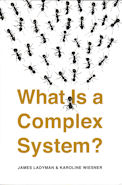What is a complex system?
Although “complexity science” is used to understand phenomena
as diverse as the behavior of honeybees, economic markets,
the human brain, and the climate, there is no agreement about its foundations.
In this introduction for students, academics, and general readers,
philosopher of science James Ladyman and physicist Karoline Wiesner
develop an account of complexity that brings the different concepts
and mathematical measures applied to complex systems into a single framework.
They introduce the different features of complex systems,
discuss different conceptions of complexity in the literature,
and develop their own account.
They explain why complexity science is so important in today’s world.
Complex systems are all around us, and the topic is a hot area of study.
But just what is a Complex System? They are not easy to define.
Here, Ladyman and Wiesner discuss several aspects of Complex Systems,
and tackle the definition problem.
The issue is that there are several kinds of complex system,
and there is not one set of features that is sufficient and necessary for all these kinds.
What the authors do is discuss a collection of 10 features that cover these cases,
and which features are applicable to which kinds of system.
The 10 features covered are: numerosity (many interacting components);
disorder and diversity (no centralised control of heterogeneous components);
feedback from iterated interactions;
non-equilibrium (open to the environment);
self-organisation emerging from interactions;
non-linear dependence on driving forces;
robustness to (certain) perturbations;
nested structure and modularity including multiple scales;
history and memory;
adaptive behaviour.
This is a pragmatic approach to Complex Systems,
putting structure on the domain without requiring overall uniformity.
(The study of complex systems is complex!)
It is a useful book that sits neatly between
pop science introductory books, and more formal academic texts.

